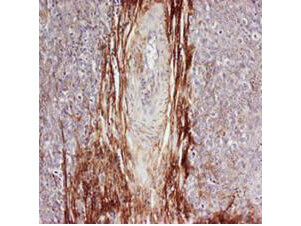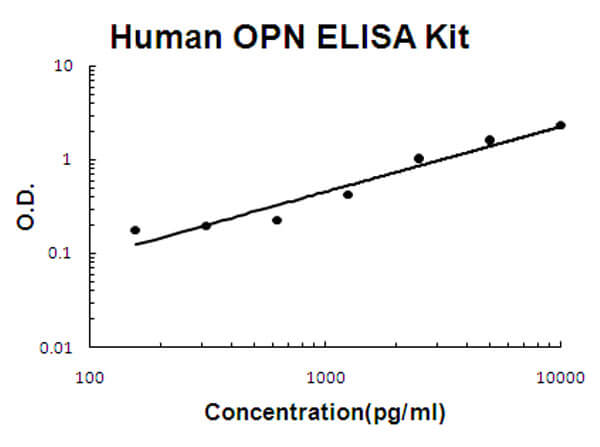Datasheet is currently unavailable. Try again or CONTACT US
SPP1 Antibody
Rabbit Polyclonal
1 References
600-401-ET6
100 µg
Liquid (sterile filtered)
WB, ELISA, IHC, IF
Human, Mouse, Rat
Rabbit
Shipping info:
$50.00 to US & $70.00 to Canada for most products. Final costs are calculated at checkout.
Product Details
Anti-SPP1 (RABBIT) Antibody - 600-401-ET6
SPP1 Antibody, OPN, BNSP, BSPI, ETA-1, OPN, PSEC0156, Osteopontin, Bone sialoprotein 1, SPP-1
Rabbit
Polyclonal
IgG
Target Details
SPP1 - View All SPP1 Products
Human, Mouse, Rat
Conjugated Peptide
Anti-SPP1 antibody was prepared from whole rabbit serum produced by repeated immunizations with an 18 amino acid peptide near the N-terminus of human SPP1.
Anti-SPP1 Antibody is Protein A purified. SPP1 antibody is human, mouse and rat reactive. Multiple isoforms of SPP1 are known to exist.
Application Details
ELISA, IF, IHC, WB
Anti-SPP1 Antibody has been tested for use in ELISA, Western Blotting, Immunohistochemistry and Immunofluorescence. Specific conditions for reactivity should be optimized by the end user. Expect a band at approximately 35 kDa in Western Blots of specific cell lysates and tissues.
Formulation
1.0 mg/mL by UV absorbance at 280 nm
0.01 M Sodium Phosphate, 0.25 M Sodium Chloride, pH 7.2
0.02% (w/v) Sodium Azide
None
Shipping & Handling
Dry Ice
Store vial at -20° C prior to opening. Aliquot contents and freeze at -20° C or below for extended storage. Avoid cycles of freezing and thawing. Centrifuge product if not completely clear after standing at room temperature. This product is stable for several weeks at 4° C as an undiluted liquid. Dilute only prior to immediate use.
Expiration date is one (1) year from date of receipt.
The secreted protein 1 (SPP1), also known as osteopontin, is a major noncollagenous protein of bone, but is also found in the extracellular matrix of other mineralized tissues and in bodily fluids. In bone, SPP1 is produced by osteoblasts, osteocytes, macrophages, and osteoclasts (1,2). SPP1 binds to cells through integrin and non-integrin receptors, as well as the adhesion receptor CD44 in an RGD-independent manner, enabling SPP1 to induce a number of functional effects including macrophage chemotaxis, cytoprotection, and regulation of T helper type 1 cells (2). SPP1 can regulate biomineralization by inhibiting the formation of hydroxyapatite (3) and the growth of calcium oxalate crystals (4).
Li N et al. (2023). Mapping and modeling human colorectal carcinoma interactions with the tumor microenvironment. Nat Commun.
Applications
Proximity Ligation Assay (PLA)
This product is for research use only and is not intended for therapeutic or diagnostic applications. Please contact a technical service representative for more information. All products of animal origin manufactured by Rockland Immunochemicals are derived from starting materials of North American origin. Collection was performed in United States Department of Agriculture (USDA) inspected facilities and all materials have been inspected and certified to be free of disease and suitable for exportation. All properties listed are typical characteristics and are not specifications. All suggestions and data are offered in good faith but without guarantee as conditions and methods of use of our products are beyond our control. All claims must be made within 30 days following the date of delivery. The prospective user must determine the suitability of our materials before adopting them on a commercial scale. Suggested uses of our products are not recommendations to use our products in violation of any patent or as a license under any patent of Rockland Immunochemicals, Inc. If you require a commercial license to use this material and do not have one, then return this material, unopened to: Rockland Inc., P.O. BOX 5199, Limerick, Pennsylvania, USA.


